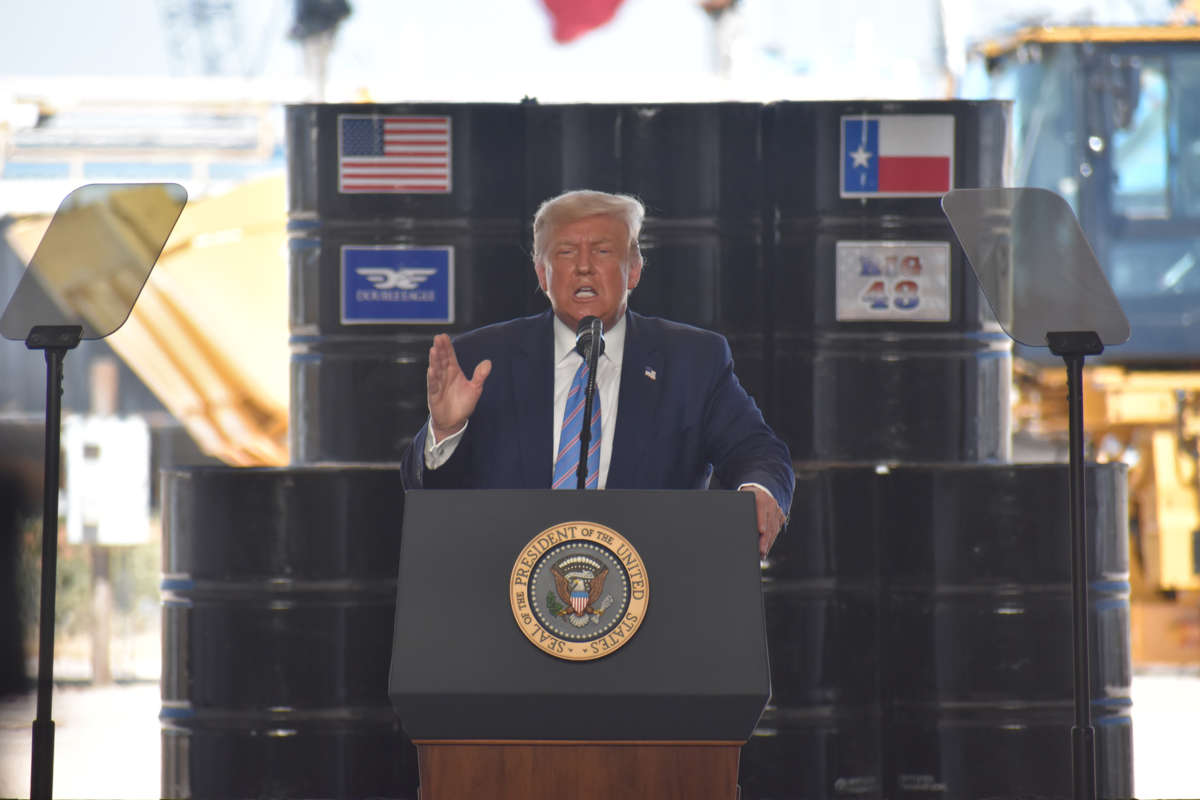GOP Proposes Letting Fossil Fuel Firms Sue Sick Workers Seeking Compensation

President Trump delivers his remarks at Double Eagle Energy oil rig in Midland, Texas, on June 29, 2020.
KYLE MAZZA / ANADOLU AGENCY VIA GETTY IMAGES
BYAlexis Goldstein, Truthout PUBLISHED August 5, 2020

PART OF THE SERIES
Despair and Disparity: The Uneven Burdens of COVID-19
Fossil fuel firms have long argued that addressing climate change will kill jobs — but the main entities killing oil and gas jobs lately have been fossil fuel firms.
Rather than save jobs, oil firms have lined executive pockets just before declaring bankruptcy, and announced layoffs rather than cut into shareholder profits. Some oil workers are even dying on the job — and instead of increasing safety and transparency, oil companies have pushed Congress to make it impossible for workers and families to sue if they get sick due to unsafe conditions.
We have seen this pattern before with the coal industry, which has long fought efforts to fund benefits to workers who contracted “black lung” in mines. Now, it’s oil and gas firms that are putting profits ahead of the lives of their own workers.
For years, one of the main selling points that oil firms used to lure investors was the amount of dividends they pay to shareholders. Exxon is a case in point: It has raised its dividend 37 years in a row, paying out more than $14 billion in cash dividend payments to its shareholders in 2019. But facing a $2.63 billion loss in the second quarter, Exxon decided to lay off workers rather than cut its shareholder dividend. For workers who manage to survive the layoffs, Exxon will be ending its employer match to workers’ retirement savings plans — a common benefit at major corporations where the firm matches any contributions a worker makes to their 401(k).
This comes despite the implicit support Exxon has received from the Federal Reserve. The Fed has been leveraging $75 billion in public money provided by the CARES Act 10-to-1, allowing them to purchase up to $750 million in corporate bonds and exchange-traded funds through two new programs. The Fed has purchased nearly $300 million in debt from energy and utility companies — drawing scrutiny from 70 environmental and economic justice groups, who’ve asked the Fed to end these purchases.
The Fed’s purchases include $9 million worth of Exxon’s corporate bonds. But the central bank won’t be telling Exxon to save workers’ jobs: Congress and the Fed both failed to create any binding requirements that companies benefiting from these programs retain their workers.The response of fossil fuel firms and the Trump administration alike to the potentially lethal working conditions for oil and gas workers has been to bury the data and prevent workers from suing.
Many oil producers have struggled with a decade of bad bets that were compounded by the spring plunge in oil prices. But that hasn’t stopped them from pushing money out the door to their executives right before they collapse. Last week, the oil and gas drilling firm Noble Corp, which employs 1,600 workers, filed for bankruptcy. Only weeks prior, Noble Corp decided to pay all of its executives their full bonus for 2020, including a $4.2 million pay package for its CEO.
Noble Corp is hardly the first oil and gas firm to make sure its executives got their bonuses just before the company crumbled. Chesapeake Energy, struggling with $9 billion in debt amid crashing oil prices, decided in May to pre-pay 21 executives $25 million in bonuses to ensure they stayed motivated. By the end of June, they were bankrupt. Further, both Whiting Petroleum and Extraction Oil & Gas gave their executives millions in bonuses a mere week before going bankrupt — Whiting Petroleum executives nabbed $14.6 million in cash bonuses and Extraction executives pocketed $6.7 million.
The response of fossil fuel firms and the Trump administration alike to the potentially lethal working conditions for oil and gas workers has been to bury the data and prevent workers from suing. Fossil fuel giants like ConocoPhillips and Exxon lobbied Congress to grant them legal immunity should their workers get sick, as documented by Friends of the Earth. The liability shield proposed by Senate Republicans even allows firms to sue their own workers should they try and seek recompense if they get sick.The liability shield proposed by Senate Republicans even allows firms to sue their own workers should they try and seek recompense if they get sick.
This comes as reporting indicates offshore oil rigs may be hotbeds for the virus. On April 8, the Coast Guard reported that at least 26 workers on oil rigs in the Gulf of Mexico had tested positive for COVID-19. Since then, the count has gone dark as the Trump administration refused to disclose new case numbers.
But the problem appears bleak based on numbers coming out of Mexico where 202 employees and five contractors have died of coronavirus at the state-owned oil producer Petróleos Mexicanos (Pemex) — the highest coronavirus death rate of any company in the world, according to Bloomberg. Pemex has been disclosing coronavirus deaths on a daily basis. By contrast, ExxonMobil has declined to report any information at all about the death of its workers due to coronavirus.
Fossil fuel firms are sacrificing their workers’ jobs and safety for profits. The sector can’t blame the pandemic for its troubles, as its troubles predate coronavirus.
By rewarding executives just before bankruptcy, slashing jobs to please investors and pushing for immunity even if they endanger their workers, these firms are proving themselves to be the real job killers. With the Fed’s ongoing purchase of fossil fuel firms’ debt, the public itself is an unwilling enabler of the sector’s approach of pursuing profits, no matter the cost.
No comments:
Post a Comment